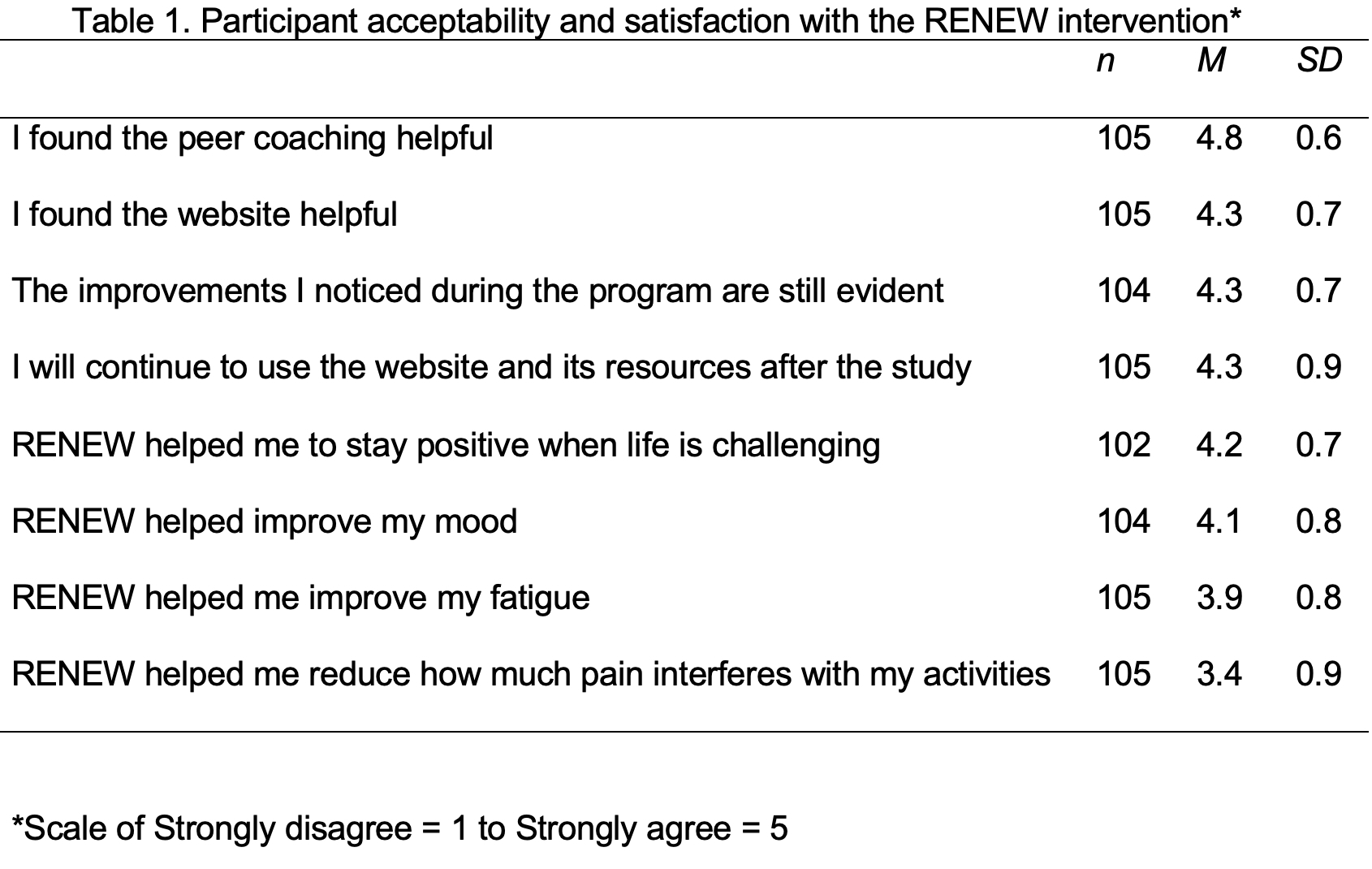Session Information
Session Type: Poster Session B
Session Time: 10:30AM-12:30PM
Background/Purpose: Non-pharmacological fatigue management interventions in systemic sclerosis (SSc) are limited, despite people with SSc reporting that fatigue is inadequately addressed with clinical care. We designed the 12-week online peer-led resilience-building energy management (RENEW) intervention to address fatigue and other symptoms for people with SSc. This intervention integrated patient preferences and professional recommendations and was grounded in cognitive behavioral therapy principles and positive psychology. Our study aims to evaluate acceptability and satisfaction of RENEW intervention in people with SSc.
Methods: The intervention provided education for managing fatigue and other symptoms through the RENEW website/app. Participants in RENEW engaged in nine one-on-one online sessions led by trained peer health coaches with SSc over 12 weeks, weekly for the first 6 weeks then bi-weekly. Each session included discussions on setting healthy goals, tracking progress, and providing support and encouragement. Experiences with RENEW were evaluated using a questionnaire designed for the study. Acceptability (perceived usefulness and effectiveness of the intervention) and satisfaction with the website/app and health coaching were rated using 5-point Likert scales (from 1- 5; strongly disagree to strongly agree). Participants also rated the overall program quality and intervention aspects and whether they would recommend RENEW to others. Participants also provided open-ended feedback. Data were analyzed using descriptive statistics and qualitative content analysis.
Results: Participants in RENEW (n = 115; mean age = 54 ± 11 years) were mostly women (92%) and White (82%). Forty-four percent had diffuse SSc; 60% had an early disease duration (≤ 5 years). 63% of participants attended all health coaching sessions. Among those who completed the questionnaire (n = 105), mean Likert scores ranged from 3.4 to 4.8 (Table 1), with 99% rating RENEW as excellent or good and willing to recommend it to others with SSc. Feedback showed that 48% liked both the website/app and health coaching equally, 48% favored health coaching alone, and only 4% preferred the website alone. Reasons for valuing health coaching included the opportunity to talk with someone who is also living with SSc (50%) and feeling more accountable to achieve goals with peer health coaches (37%). Participants mentioned the three best aspects of RENEW as: 1) the supportive nature of health coaching, including providing guidance and boosting confidence in adopting healthy behaviors; 2) useful educational content on the website/app, particularly the self-care and relaxation modules; and 3) convenience and access of online meetings. Suggestions for improving RENEW included enhancing the app’s functionality and having follow-up sessions to provide ongoing support.
Conclusion: Participants with SSc rated acceptability and satisfaction highly for the peer-led RENEW intervention. These insights are valuable for refining and implementing future SSc interventions nationwide to mitigate burdensome symptoms.
To cite this abstract in AMA style:
Murphy S, Chen Y, Harper A, Shah N, Alore M, Hicks S, Pape A, Khanna D. Acceptability and Satisfaction of an Online Resilience-Building Intervention with Peer Health Coaches for Managing Fatigue and Well-Being in Systemic Sclerosis [abstract]. Arthritis Rheumatol. 2024; 76 (suppl 9). https://acrabstracts.org/abstract/acceptability-and-satisfaction-of-an-online-resilience-building-intervention-with-peer-health-coaches-for-managing-fatigue-and-well-being-in-systemic-sclerosis/. Accessed .« Back to ACR Convergence 2024
ACR Meeting Abstracts - https://acrabstracts.org/abstract/acceptability-and-satisfaction-of-an-online-resilience-building-intervention-with-peer-health-coaches-for-managing-fatigue-and-well-being-in-systemic-sclerosis/

